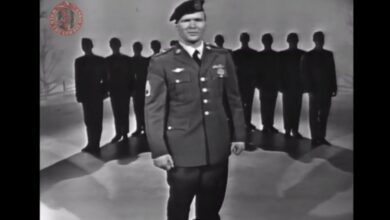Freddy penned this song in 1956, and it soared to popularity in the 70s. Well done, Freddy!
Freddy Fender, originally named Baldemar Garza Huerta and born on June 4, 1937, in San Benito, Texas, is celebrated as a groundbreaking artist who skillfully blended traditional Mexican music with elements of country and rock. His journey reflects the vibrant cultural landscape of South Texas, where diverse musical influences came together to create a unique sound that resonated deeply with many. Growing up in a Tejano household, Fender was immersed in music from an early age, a foundation that shaped his multifaceted musical career. His family celebrated their heritage through song, which significantly influenced his artistic growth.
As a teenager, Fender began performing actively, seizing opportunities to play at local dances and gatherings. His early career was characterized by a quest for artistic identity, experimenting with various stage names, including “El Bebop Kid.” He recorded several singles that highlighted his vocal talent and songwriting abilities, though they initially did not achieve significant recognition. These formative years were essential for not only honing his musical style but also understanding the intricacies of the music industry. Fender navigated the business while striving to honor both his Mexican roots and his passion for American music.
A pivotal moment in Fender’s career arrived in the late 1950s with the release of “Wasted Days and Wasted Nights,” which would become one of his hallmark songs. The themes of regret and nostalgia resonated with listeners, showcasing his gift for expressing universally relatable emotions. However, his growing career faced a setback in 1960 when he was arrested for marijuana possession, leading to a significant interruption in his music journey. During his time in prison, he reflected on his life and vowed to return to music with renewed purpose.
After his release, Fender entered a music industry that was evolving, increasingly open to diverse influences. The 1970s welcomed a greater acceptance of cultural fusions, creating an ideal environment for his comeback. The release of “Before the Next Teardrop Falls” in 1974 marked a significant resurgence for Fender. This song, with its poignant lyrics and heartfelt delivery, struck a deep chord with listeners, embodying the themes of loss and sorrow that many could relate to. Its commercial success established him firmly in both the pop and country music scenes, expanding his audience like never before.
The re-release of “Wasted Days and Wasted Nights” in 1975 showcased Fender’s artistic evolution, climbing the charts and underscoring both his talent and the enduring appeal of his music. His ability to seamlessly bridge genres, often referred to as “Tex-Mex,” became a defining feature of his career and reflected Texas’s rich cultural mix. Fender’s music resonated with both Anglo and Latino audiences, allowing him to collaborate with a diverse range of artists and contribute significantly to the rise of country and Tejano music across the United States.
Fender’s live performances were filled with energy and sincerity, fostering strong connections with audiences. He recognized the importance of engaging with fans, and his charismatic stage presence played a crucial role in his popularity. Throughout the late 1970s and into the 1980s, he continued to tour and record, composing songs that celebrated the joys and challenges of life. His work inspired a new generation of musicians eager to honor their heritage while exploring wider musical expressions. Fender became not only a beloved artist but also a mentor to those who came after him.
Freddy Fender’s legacy extends beyond his chart-topping hits; he is an enduring symbol of cultural integration and representation. His contributions were recognized through numerous awards, including Grammy nominations and wins. In 2002, he received a posthumous induction into the Texas Country Music Hall of Fame, solidifying his status as a trailblazer in the industry. This honor acknowledged not just his musical talents but also the impact he made on the cultural landscape and the opportunities he opened for future artists.
Even as health challenges emerged in the late 1990s, Fender remained committed to his music until his passing on October 14, 2006, in Corpus Christi, Texas. He left behind an impressive catalog of music that still resonates today. His most famous songs, including “Wasted Days and Wasted Nights” and “Before the Next Teardrop Falls,” continue to be cherished across generations, frequently covered by new artists eager to capture his timeless sound.
Freddy Fender’s life is a story of resilience and determination, illustrating how an artist’s journey is shaped by both personal and cultural experiences. His music embodies universal themes of love, loss, and identity, reaching a broad audience while staying true to his Mexican heritage. This harmonious blend of cultural authenticity and artistic growth demonstrates the power of music as a medium for expression and connection, transcending language and ethnicity barriers. Today, Fender’s legacy is an essential chapter in the American music narrative, embodying the spirit of innovation and cultural celebration that enriches the musical experience.
In the broader context of American music, Freddy Fender exemplifies the ongoing conversation between various cultural traditions and the synthesis that can emerge when artists draw from their identities. His journey from modest beginnings in San Benito to becoming a significant cultural icon showcases the influence of dedication and passion in the pursuit of artistic aspirations. As his music continues to inspire new generations, it serves as a lasting reminder of the beauty in cultural fusion and the shared stories that unite us all through the universal language of song.





